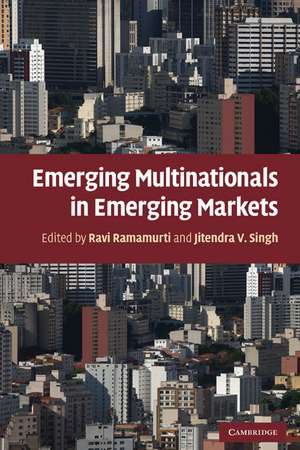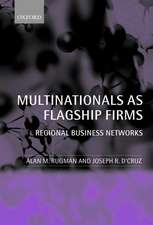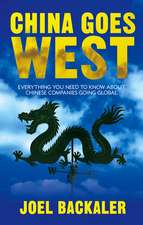Emerging Multinationals in Emerging Markets
Editat de Ravi Ramamurti, Jitendra V. Singhen Limba Engleză Paperback – 21 iul 2010
| Toate formatele și edițiile | Preț | Express |
|---|---|---|
| Paperback (1) | 449.55 lei 6-8 săpt. | |
| Cambridge University Press – 21 iul 2010 | 449.55 lei 6-8 săpt. | |
| Hardback (1) | 899.00 lei 6-8 săpt. | |
| Cambridge University Press – 15 apr 2009 | 899.00 lei 6-8 săpt. |
Preț: 449.55 lei
Nou
Puncte Express: 674
Preț estimativ în valută:
86.03€ • 89.70$ • 71.50£
86.03€ • 89.70$ • 71.50£
Carte tipărită la comandă
Livrare economică 21 martie-04 aprilie
Preluare comenzi: 021 569.72.76
Specificații
ISBN-13: 9780521160186
ISBN-10: 0521160189
Pagini: 460
Ilustrații: 27 b/w illus. 32 tables
Dimensiuni: 150 x 224 x 23 mm
Greutate: 0.72 kg
Editura: Cambridge University Press
Colecția Cambridge University Press
Locul publicării:Cambridge, United Kingdom
ISBN-10: 0521160189
Pagini: 460
Ilustrații: 27 b/w illus. 32 tables
Dimensiuni: 150 x 224 x 23 mm
Greutate: 0.72 kg
Editura: Cambridge University Press
Colecția Cambridge University Press
Locul publicării:Cambridge, United Kingdom
Cuprins
List of figures; List of tables; Abbreviations; List of contributors; Acknowledgements; Part I. Introduction: 1. Why study emerging market MNEs? Ravi Ramamurti; 2. Third world multinationals: a look back Louis T. Wells, Jr; 3. Theoretical aspects of MNEs from emerging markets Alan Rugman; 4. Does firm ownership matter? POEs vs. FOEs in the developing world Alice H. Amsden; Part II. Country Studies: 5. Chinese multinationals: emerging through new global gateways Peter Williamson and Ming Zeng; 6. Indian multinationals: generic internationalization strategies Ravi Ramamurti and Jitendra V. Singh; 7. Russian multinationals: natural resource champions Daniel J. McCarthy, Sheila M. Puffer and Oleg S. Vikhanski; 8. Brazilian multinationals: surfing the waves of internationalization Afonso Fleury and Maria Tereza Leme Fleury; 9. South African multinationals: building on a unique legacy Andrea Goldstein and Wilson Prichard; 10. Mexican multinationals: lessons from Cemex Donald R. Lessard and Rafel Lucea; 11. Thai multinationals: struggling to enter the big league Pavida Pananond; 12. Israeli multinationals: competing from a small open economy Yair Aharoni; Part III. Conclusions: 13. What have we learned about emerging-market MNEs? Ravi Ramamurti; Index.
Recenzii
'This volume is an excellent contribution to the literature on emerging multinationals. But what I particularly liked about this particular group of essays was that, following four carefully written and analytical robust chapters on the origin and determinants of the foreign activities of emerging MNEs, there followed eight quite distinctive and original case studies of those new forms of investment by particular home countries. Inter alia these revealed that each emerging country has its own particular reasons and agenda for investing outside its national boundaries. Altogether, I found this a first rate and eminently readable group of essays. The volume deserves the widest attention of government, the business community, and academic scholars alike.' John H. Dunning, Rutgers University and Reading University
'Ramamurti and Singh have masterfully engineered a productive confrontation between extant theorizing in international business and the empirical phenomenon of newer multinationals from emerging markets. All scholarship is enriched as a result.' Tarun Khanna, Harvard Business School and author of Billions of Entrepreneurs: How China and India Are Reshaping Their Future and Yours
'Just as every person discovers his own path in life, so too with companies and countries. This is a fascinating book with comments on the multiple pathways adopted by emerging countries in their quest for globalization. An exhilarating read, a wondrous experience.' R. Gopalakrishnan, TATA Sons Ltd
'Multinational enterprises from emerging markets are in the process of transforming the world FDI market. This book goes a long way in analyzing the main players in this process and the forces driving it, and does so in a very illuminating way.' Karl Sauvant, Vale Columbia Center on Sustainable International Investment
'Ramamurti and Singh make an outstanding contribution to understanding the new configuration of world markets and its new competitive structure. As the different country studies show, multinationals from emerging economies share a number of common structural features, as well as the imprinting of specific local experiences. For managers and business practitioners, the book offers valuable tips on how to shape the new international order.' Henrique Rzezinski, Chairman, Brazil-US Business Council
'Emerging Multinationals in Emerging Markets is a fascinating and timely volume that will be of great value not only to students of international business theory but also to practitioners heading emerging world multinationals and those in the developed world competing with them. As a long time executive of an EMNE, and now heading an association of CEOs of EMNEs, I found the case studies in Part 2 to be particularly interesting.' Michael Spicer, CEO, Business Leadership South Africa
'… provides a starting point for future research, theoretically and empirically, on a number of important issues, among which are how EM MNEs successfully enter into the desired markets and compete against powerful counterparts from developed countries and what unique strategies and practices they adopt to leverage their strengths, mitigate their weaknesses, and foster their evolution in the increasingly integrated yet significantly differentiated world.' Administrative Science Quarterly
'Ramamurti and Singh have masterfully engineered a productive confrontation between extant theorizing in international business and the empirical phenomenon of newer multinationals from emerging markets. All scholarship is enriched as a result.' Tarun Khanna, Harvard Business School and author of Billions of Entrepreneurs: How China and India Are Reshaping Their Future and Yours
'Just as every person discovers his own path in life, so too with companies and countries. This is a fascinating book with comments on the multiple pathways adopted by emerging countries in their quest for globalization. An exhilarating read, a wondrous experience.' R. Gopalakrishnan, TATA Sons Ltd
'Multinational enterprises from emerging markets are in the process of transforming the world FDI market. This book goes a long way in analyzing the main players in this process and the forces driving it, and does so in a very illuminating way.' Karl Sauvant, Vale Columbia Center on Sustainable International Investment
'Ramamurti and Singh make an outstanding contribution to understanding the new configuration of world markets and its new competitive structure. As the different country studies show, multinationals from emerging economies share a number of common structural features, as well as the imprinting of specific local experiences. For managers and business practitioners, the book offers valuable tips on how to shape the new international order.' Henrique Rzezinski, Chairman, Brazil-US Business Council
'Emerging Multinationals in Emerging Markets is a fascinating and timely volume that will be of great value not only to students of international business theory but also to practitioners heading emerging world multinationals and those in the developed world competing with them. As a long time executive of an EMNE, and now heading an association of CEOs of EMNEs, I found the case studies in Part 2 to be particularly interesting.' Michael Spicer, CEO, Business Leadership South Africa
'… provides a starting point for future research, theoretically and empirically, on a number of important issues, among which are how EM MNEs successfully enter into the desired markets and compete against powerful counterparts from developed countries and what unique strategies and practices they adopt to leverage their strengths, mitigate their weaknesses, and foster their evolution in the increasingly integrated yet significantly differentiated world.' Administrative Science Quarterly
Descriere
A distinguished group of international business scholars explore how firms internationalize in today's global economy.
















